新概念2 lesson 12
- 格式:doc
- 大小:70.50 KB
- 文档页数:5
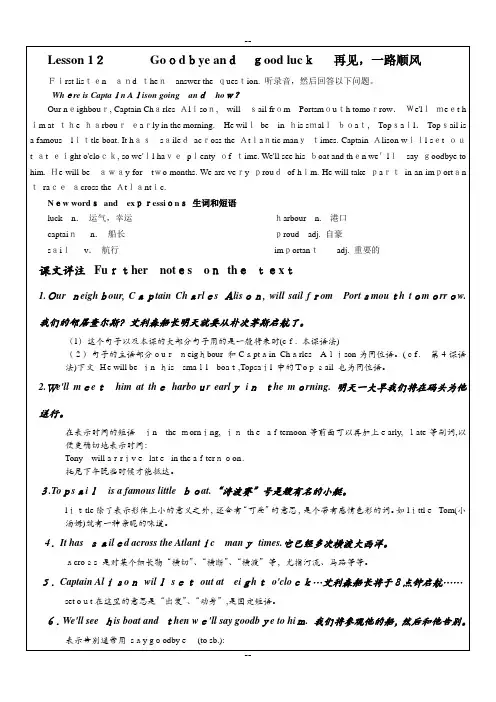
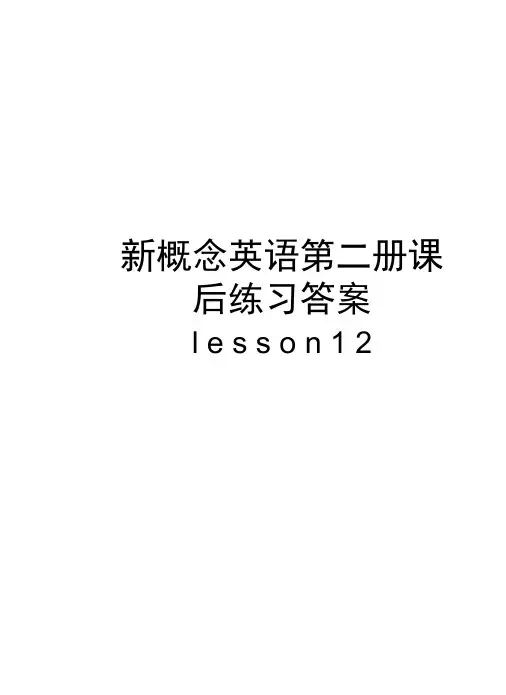
新概念英语第二册课后练习答案l e s s o n 1 2新概念英语第二册课后习题答案详解Less on 12练习答案Key to written exercises1 •关键句型练习答案A will sail (1.1); shall meet (1.2); will be (1.3); will set out (11.4-5); shall have(1.5);shall see (1.5); shall say (1.6);will be (1.6); will take part (1.7)C I shall go to the theatre …Reg and I shall see the firstperformanee …the producer will give a short speech. He will speak to …The play will be very …people will enjoy it very much.2 •难点练习答案1 He is not back yet. He will be back in ten minu tes.2 A new play is on at the Globe Theatre.3 When the con cert was over, We went home.4 They will set out/ off very early tomorrow morning. (Here be off is also possible.)5 You can't take the exam yet. You are not up to it.6 He will be away from home for two mon ths.7 She swam across the En glish Channel and set up a new world record.3 •多项选择题答案1. c根据课文第3-4 行Topsail is a famous little boat. It has sailed acrosstheAtlantic many times,只有c能够说明为什么Topsail is famous而其他3个选择都不符合逻辑。

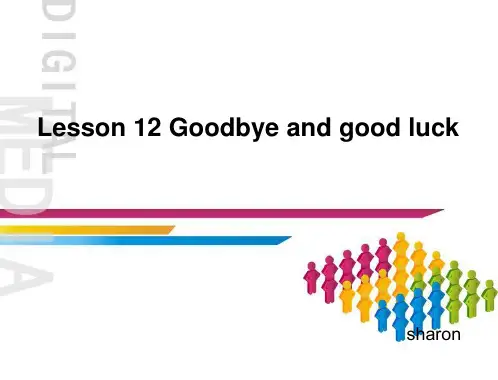
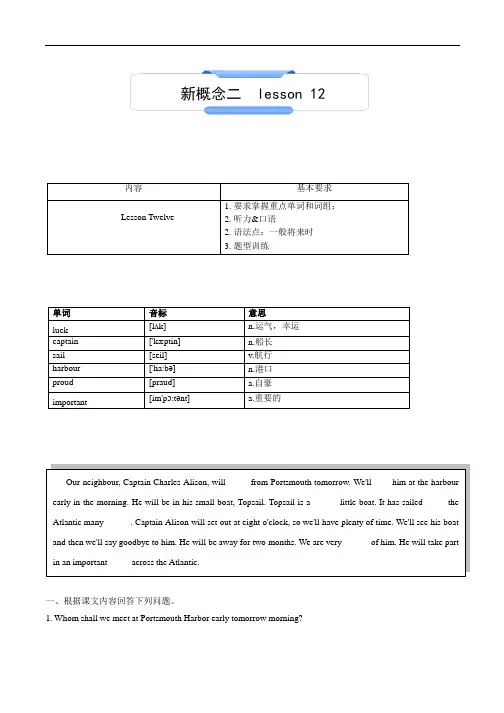
新概念二 lesson 12一、根据课文内容回答下列问题。
1. Whom shall we meet at Portsmouth Harbor early tomorrow morning?____________________________________________________________________________________________2. Where will he be?____________________________________________________________________________________________ 3. At what time will he leave?____________________________________________________________________________________________ 4. Shall we say goodbye to him, or shall we travel with him?____________________________________________________________________________________________ 5. What will he take part in?____________________________________________________________________________________________二、根据答案,对本文章进行口头转述。
____________________________________________________________________________________________ ____________________________________________________________________________________________ ____________________________________________________________________________________________ ____________________________________________________________________________________________Goodbye and good luck1. luck n. 运气,幸运1)good luck______ bad luck________Wish you good luck!2)by luck 侥幸地I won the game by luck.3)lucky dog_________You’re really a lucky dog!2.set outset out to do sthHe will set out to do homework as soon as his mother comes back,【拓展】1) set down2) set off ,侧重于去某个地方,=leave for.If you want to catch that train we'd better set off for the station immediately.3) set about,与set out意思相近,但set out后加不定式,即set out to do sth,而set about后加 ing形式,即set about doing sth.Do you know how to set about going on this work?【练习】根据句子意思选择set off/ set out/ set about/ set down的正确形式填空。
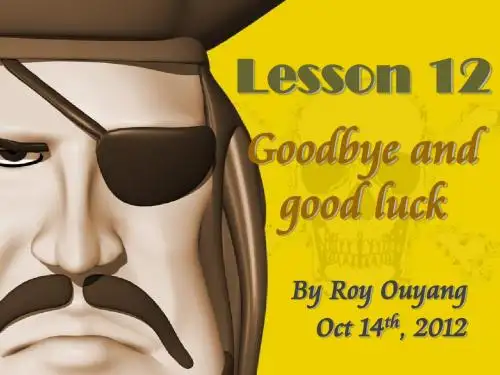
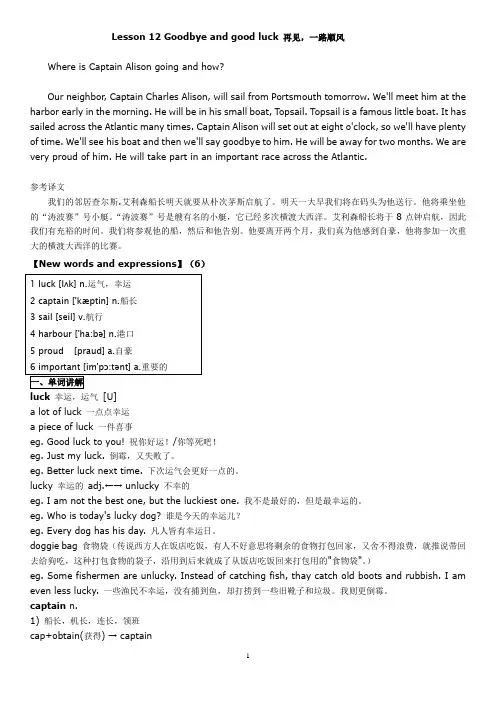
Lesson 12 Goodbye and good luck 再见,一路顺风Where is Captain Alison going and how?Our neighbor, Captain Charles Alison, will sail from Portsmouth tomorrow. We'll meet him at the harbor early in the morning. He will be in his small boat, Topsail. Topsail is a famous little boat. It has sailed across the Atlantic many times. Captain Alison will set out at eight o'clock, so we'll have plenty of time. We'll see his boat and then we'll say goodbye to him. He will be away for two months. We are very proud of him. He will take part in an important race across the Atlantic.参考译文我们的邻居查尔斯.艾利森船长明天就要从朴次茅斯启航了。
明天一大早我们将在码头为他送行。
他将乘坐他的“涛波赛”号小艇。
“涛波赛”号是艘有名的小艇,它已经多次横渡大西洋。
艾利森船长将于8点钟启航,因此我们有充裕的时间。
我们将参观他的船,然后和他告别。
他要离开两个月,我们真为他感到自豪,他将参加一次重大的横渡大西洋的比赛。
【New words and expressions】(6)luck幸运,运气[U]a lot of luck 一点点幸运a piece of luck 一件喜事eg. Good luck to you! 祝你好运!/你等死吧!eg. Just my luck. 倒霉,又失败了。
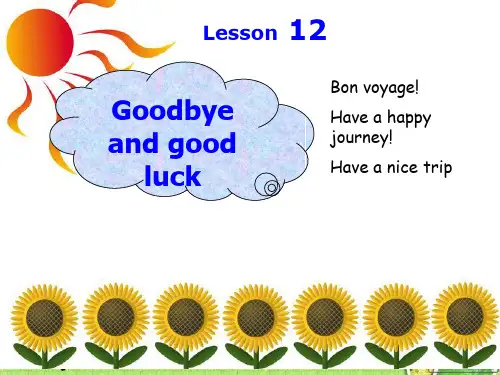
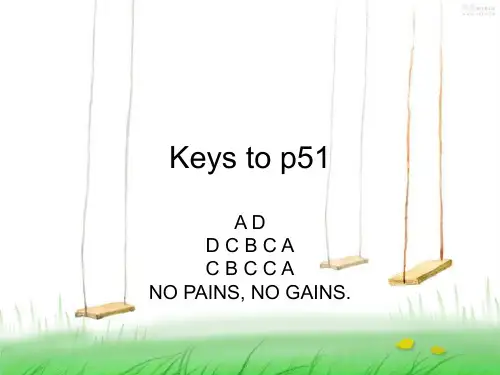

主讲:Mike有兴趣的可以加我的QQ :290143015我们可以一起交流英语,互相学习,交流好的英语课件,交流好的英语口语!期待你的到来!Being Excellent Is What Never Dies-----MikeMike 更多资料在地址:/?busin ess&aid=6&un=wdeshouji#7欢迎大家下载、交流。
!开始学习吧!Mike 语法经典讲解词法部分完型填空考查内容语篇信息词汇手段语法手段逻辑手段复现同现替代省略顺序关系并列关系分指关系转折关系解释关系因果关系语法项目新概念英语第二册Lesson 12Goodbye and good luck 主讲:MikeToday we’ll listen to a story about a man taking part in a race across the Atlantic.KEY WORDS ANDEXPRESSIONScaptainn.船长sailv.航行harbourn.港口the Atlantic大西洋plenty of time充裕的时间take part in参加prouda.自豪的importanta.重要的Charles Alison 查尔斯·艾利森Portsmouth朴茨茅斯Questions:What will Captain Charles Alison do tomorrow morning? Why is Topsail a famous little boat?How long will Captain Alison be away?Question 1:What will Captain Charles Alison do tomorrow morning?Question 2:Why is Topsail a famous little boat?Question 3:How long will Captain Alison be away?Answer :He will sail from Portsmouth tomorrow morning. He will take part in animportant race across the Atlantic.Answer :Because it has sailed across the Atlantic many times.Answer:He will be away for two months.Our neighbour, Captain Charles Alison, will sail from Atlantic many times. Captain Alison will set out at eight Let’s meet at the school gate.I’ll be over to meet you at the airport.Portsmouth tomorrow. We’ll meet him at the harbour early in the morning. He will be in his small boat, Topsail. Topsail is a famous little boat. It has sailed across the will set out at eight o’clock, so we’ll have plenty of time. We’ll see his boat the Atlantic = the Atlantic Ocean time. We’ll see his boat and then we’ll say goodbye to him. He will be away for set out = set off, start outWe will set out for Tibet in a week.plenty of :既可修饰不可数名词,又可修饰可数名词,一般用于肯定句。
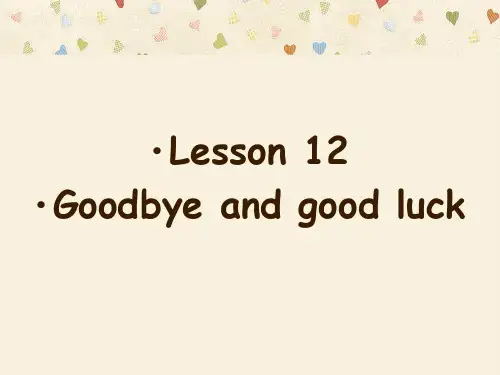
Lesson12 Goodbye and good luckSummary writing 摘要写作We shall meet Captain Charles Alison at Portsmouth Harbour early tomorrow morning. He will be in his small boat. He will leave at eight o’clock. We shall say goodbye to him. He will take part in an important race across the Atlantic.Key structures关键句型一般将来时A和B: will sail (1. 1); shall meet (1. 2); will be (1. 3); will set out (11. 4-5); shall have(1. 5); shall see (1. 5); shall say (1. 6);will be (1. 6); will take part (1. 7)C:I shall go to the theatre with my friend.. Reg and I will see the first performa nce …the producer will give a short speech. He will speakto …The play will be very… people will enjoy it very much.Special difficulties难点练习1 He is not back yet. He will be back in ten minutes.2 A new play is on at the Globe Theatre.3 When the concert was over, we went home.4 They will set out/ off very early tomorrow morning. (Here be off is also possible. )5 You can't take the exam yet. You are not up to it.6 He will be away from home for two months.7 She swam across the English Channel and set up a new world record. Multiple choice questions多选l.(c) 2.(c) 3.(a) 4.(d) 5.(d) 6.(a) 7.(d) 8.(a) 9.(c) 10.(d) 11.(a) 12.(a) Sentence structure句子结构We shall meet him at the harbour early in the morning.练习册A abbreviations 缩写1It's 2 We're 3I'm 4It's 5We've 6She'll 7isn't 8hasn't 9doesn't 10don't11didn't 12won'tBl He will spend Wednesday night with his family.2 They will visit him to say goodbye.3He will get up at 3 a.m. on Thursday.4He will set sail at 4 o'clock.5We can only say what we hope to do.C be+adv.I will ...be away 2 be back 3 were out 4 will be in 5is all over 6 is on 7 was...up to 8 is...up 9 am after(此处after是介词)D (A possible answer)Thanks for your letter. I am very pleased to hear from you. I will be away next Monday and Tuesday. I will be out on Wednesday morning. I will not be in on Thursday afternoon, but I will be back on Friday morning. So I can see you on Wednesday afternoon or Thursday morning. Please don't come too early in th e morning. Remember: I’m not usually up till ten。
Lesson 12 Goodbye and good luck 再见,一路一路顺风顺风顺风First listen and then answer the question.听录音,然后回答以下问题。
Where is Captain Alison going and how?Our neighbour, Captain Charles Alison, will sail from Portsmouth tomorrow. We'll meet him at the harbour early in the morning. He will be in his small boat, Topsail. Topsail is a famous little boat. It has sailed across the Atlantic many times. Captain Alison will set out at eight o'clock, so we'll have plenty of time. We'll see his boat and then we'll say goodbye to him. He will be away for two months. We are very proud of him. He will take part in an important race across the Atlantic.New words and expressions 生词和短语luck (title) /l)nk/ n. 运气,幸运harbour (1. 2) /'ha:b+/ n. 港口captain (l. l) /'k$pt+n/ n. 船长proud (1. 7) /praud/ adj. 自豪sail (1. 1) /seil/ v. 航行important (1. 7) /im'p&:t+nt/ adj. 重要的文注释释Notes on the text 课文注1 Captain Charles Alison, 查尔斯·艾利森船长。
Lesson 12 语法一般将来时I. 一般将来时的动词形式一般将来时表示将来某个时间将要发生的动作或存在的状态,也表示将来经常或反复发生的动作。
一般将来时由助动词shall或will加动词原形构成,shall用于第一人称,will用于第二、三人称。
但是现在第一人称一般也用will,其区别并不明显。
(或“be going to + 动词原形)常与tomorrow, next… , in (the)future,soon, in five days,in two weeks等连用。
如: I shall not come if it rains tomorrow.如明天下雨我就不来。
My father will leave for China next week.我的爸爸下星期要到中国去。
“I’ll, Y ou’ll, He’ll , She’ll , It’ll, We’ll , They’ll …”是简缩形式。
II. will, be going to …的区别be going to +不定式,表示将来。
表示打算、准备做的事或即将发生或肯定要发生的事。
be going to和will相比,be going to通常表示主观或与迹象有关,will通常表示客观。
It is going to be my birthday tomorrow.(×)It will be my birthday tomorrow.(√)He is going to lose.(×)He will lose.(√)I am going to be 12 next year.(×)I will be 12 next year.(√)Look at the dark clouds, there is going to be a storm. 看看这些黑云,将有一场暴风雨。
(迹象)It’s going to be a fine day tomorrow.明天将会是个好天。
Lesson 12Goodbyeandgood luck 再见,一路顺风Our neighbour, Captain CharlesAlison,will sail fromPortsmouth tomorr ow.We'llmeet him at theharbour early in the morning.Hewill be in hissm all boat,Topsail. Topsailis a famous little boat. It has sailed acrossthe Atlantic many times. Captain Alisonwillset out at eighto'clock, sowe'll have plentyof time. We'll see his boat andthen we'llsay goodbye tohim.Hewillbeaway for twomonths. Weareveryproud of him.Hewill take part inan importantraceacrossthe Atlantic.New words and expressions生词和短语luckn.运气,幸运captainn. 船长sailv. 航行harbourn.港口pro ud adj. 自豪importantadj.重要的参考译文我们的邻居查尔斯.艾利森船长明天就要从朴次茅斯启航了。
明天一大早我们将在码头为他送行。
他将乘坐他的“涛波赛”号小艇。
“涛波赛”号是艘有名的小艇,它已经多次横渡大西洋。
艾利森船长将于8点钟启航,因此我们有充裕的时间。
我们将参观他的船,然后和他告别。
他要离开两个月,我们真为他感到自豪,他将参加一次重大的横渡大西洋的比赛。
1.Goodbye andgood luck再见,一路顺风Good luck! 这一祝愿语在英语中比“祝你好运!”在中文中使用的范围要宽得多。
Lesson 12 Goodbye and good luckStep 1 New words and expressions1.luck n. 运气,幸运2.captain n. 船长3.sail v. 航行4.harbour n. 港口5.proud adj. 自豪的6.important adj. 重要的Step 2 Grammar point一般将来时(the Simple Future Tense)I.时态定义:表示将来某一时刻的动作或状态,或将来某一段时间内经常的动作或状态。
常常和表示将来的时间状语连用。
如:1) tomorrow,the day after tomorrow,tomorrow morning/afternoon/evening2) next year/week/month/hour/day/century3) in+一段时间4) in the future5) this afternoon,Sunday,evening6) from now on7) one day,someday (未来的)某天8) soonII.一般将来时的五种表达方式:will/shall + do sth表将来Shall常用于第一人称的代词I和we的后面,而will可用于所有人称。
Tomorrow will be Sunday. 明天就是星期天。
The rain will stop soon. 雨很快就要停了。
Shall we go there at five? 我们五点钟去那儿?②be going to + do sth表将来多用于口语,强调事先打算、计划要做的事情或有某种迹象要发生的事情。
如:——What are you going to do this evening?——Look ! There are so many clouds in the sky. It’s going to rain.(看!天空有那么多云,我想要下雨了。
)【区别】1.当表示主观方面“打算,准备”去做什么事情的时候,往往用be going to +动词原形,而will 则多用来表示纯属客观的将来。
2.be going to+动词原形可表示事先计划的意图,而will 则表示说话人当时决定的意图。
【练习】1.He is studying hard and try for the exams.他正努力学习,准备参加考试。
2.—Can somebody help me? 谁能帮我一下吗?③be doing sth 表将来现在进行时表示即将发生的动作,多与表示位移的动词come, go, arrive, leave, fly, start等连用。
如:She is leaving for Beijing.(她就要启程去北京。
leave for启程,动身)○4.do sth表将来一般现在时表将来,主要用于时间状语从句和条件状语从句中,或者用来表示按照时刻表的规定将要发生的事情。
如:I’ll tell him about it as soon as I see him.我一见到他就告诉他这事儿。
My plane takes off at seven tomorrow morning. 我的飞机明天早上7点起飞。
○5be to + do sth或者是be about to do sth表将来表示按照计划或者根据安排要发生的事情。
如:Are we to go on with this work?我们计划继续进行这项工作吗?He is about to go to Shanghai.他计划要去上海。
III.语法练习考点1:考察一般将来时的定义1.He ________ very busy this week, he ________ free next week.A. will be; isB. is; isC. will be; will beD. is; will be2.He ________ in three days.A. coming backB. came backC. will come backD. is going to coming back3.–Shall I come again tomorrow afternoon?–________ (好的).A.Yes, pleaseB. Yes, you will.C. No, please.D. No, you won’t.4.–Will his parents go to see the Terra Cotta Warriors tomorrow?–No, ________ (不去).A. they willn’t.B. they won’t.C. they aren’t.D. they don’t.5.Who ________ we ________ swimming with tomorrow afternoon?A. will; goB. do; goC. will; goingD. shall; go考点2:考察一般将来时的不同表达方式1.They ________ an English evening next Sunday.A. are havingB. are going to haveC. will havingD. is going to have2.—Tell him about the news when he _______, John.—Yes, I will.A. comesB. will comeC. would comeD. is coming3. —How is Mike now?—Don’t worry. He will call us as soon as he _______ the USA.A. getsB. reachesC. will getD. will reach4.—Where are they going?—They _____ New York in a day.A.Will leaveB.will goC. are leaveD.are leaving for考点3:考察there be句型的一般将来时1.There __________ a meeting tomorrow afternoon.A.will be going toB. will going to beC. is going to beD. will go to be2.________ a concert next Saturday?A. There will beB. Will there beC. There can beD. There are3.There ________ a dolphin show in the zoo tomorrow evening.A.wasB. is going to haveC. will haveD. is going to be4.There ________ a birthday party this Sunday.A. shall beB. will beC. shall going to beD. will going to be考点4:考察从句的一般将来时1.If they come, we ________ a meeting.A. haveB. will haveC. hadD. would have2.He ________ to us as soon as he gets there.A. writesB. has writtenC. will writeD. wrote3.—How is the weather tomorrow?—I don’t know if it _______.—Well, if it _______, I won’t go for a picnic with you. (2005呼和浩特市)A. will rain; will rainB. will rain; rainsC. rains; will rainD. rains; rains 考点5:考察一般将来时的被动语态1.—But where are the books?—Don’t worry. They _______ here in time. (2005 武汉市)A. have sentB. will be sentC. are sendingD. have been sent2. Hundreds of jobs ______ if the factory closes.A. loseB. will be lostC. are lostD. will lose3. If a fire breaks out in the lab, a lot of equipments ______.A. is damagedB. had damagedC. would be damagedD. was damaged4. I need one more stamp before my collection ______.A. has completedB. completesC. is completedD. will be completedStep 3 ExerciseAIt was half past eight in the morning . The telephone bell rang and Mary went to answer it .“Hello , who’s that ? ”she asked .“It’s me ——Peter . ”Peter was a friend of Mary’s brother , Johnny .“Oh , hello , Peter . What do you want ? ”said Mary .“Can I speak to Johnny ? ”“No , ”said Mary , “you can’t speak to him now . He is busy . He is getting ready for school. He is eating his breakfast . Grandmother is combing his hair . Sister is under the table , putting his shoes on . Mother is getting his books and putting them in his schoolbag . Goodbye . I’ve got to go now . I have to hold the door open . The school bus is coming . ”What do you think of the story ? Are you sometimes like Johnny ? If so , you need to change your habits .1. It was _______ in the morning when the telephone bell rang .A. 7:00B. 7:30C. 8:30D. 9:002. Peter was Johnny’s ________.A. fatherB. friendC. uncleD. teacher3. What was Johnny doing at the moment ? He was _______.A. eating his breakfastB. answering the telephoneC. putting on his shoesD. holding the door open4. How many people can you find in the story ?A. Two.B. Four .C. Six .D. Eight .BToday people can use the phone to talk with others almost anywhere on the earth . But when you use the phone , you don’t see the person you are talking with . That may change in the near future .Today some people are using a kind of telephone called the picture phone or vision phone . With it , two people who are talking can see each other .Picture phones can be useful when you have something to show the person you’re calling . They may have otheruses in the future . One day you may be able to ring up a library and ask to see a book.Then you’ll be able to read the book right over your picture phone . Or you may be able to go shopping through your picture phone . If you see something in the newspaper that you think you want to buy , you’ll go to your phone and call the shop . People at the shop will show you the thing you’re interested in right over the phone . You’ll be able to shop all over town and never even leave your room !5. Today people can use the phone to talk with others _______.A. in all the townsB. in some places in the worldC. only in big citiesD. almost anywhere on the earth6. The word “it ”in the text means ________.A. the picture phoneB. any phoneC. the useD. the change7. We can _________ through the picture phone according to (根据)the text .A. write a bookB. do shoppingC. play gamesD. have classes语法选择DCABD BBABD CBDB BCB BBCD阅读1-7 CBACDAB。